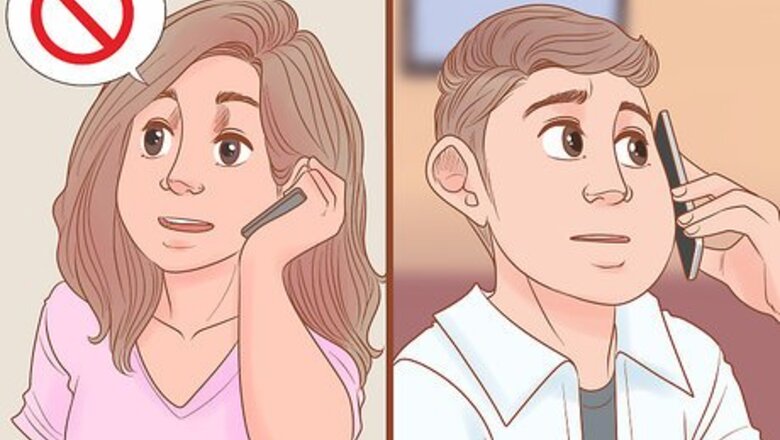
views
Declining a Date
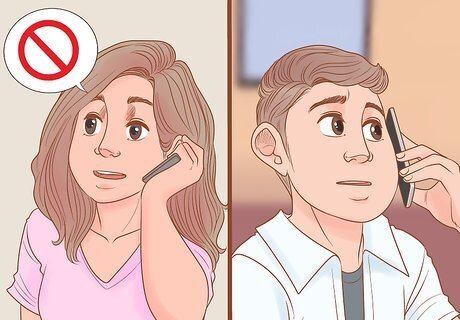
Communicate in person when possible. If you are friends with this person, try to meet them face-to-face or at least call them on the phone to talk to them. A lot can be misinterpreted over text or email, and talking in person will help you to communicate more clearly, and it also shows respect for the other person. Talking in person can eliminate that weird feeling of worrying about seeing them again if you declined the date via text. If the person asking you out is someone who makes you uncomfortable, though, do not feel the need to extend this courtesy. A simple text or email back a short response, like, “No, I’m not interested. Thank you.”

Be as honest as you can be without hurting someone’s feelings. Try to avoid making up excuses, like a fake significant other or a bogus weekend trip, just to get out of telling someone you’re not interested. Try saying something like, “Thank you for asking; that’s really flattering. But I’m just not interested in going out.” In the end, hopefully that person will appreciate that you respected their time enough to not string them along. Keep in mind that you don’t owe anyone an excuse for why you don’t want to go out with them. If you’re declining the second date, try saying something like, “I really enjoyed getting to know you better, but I just have platonic feelings toward you.”
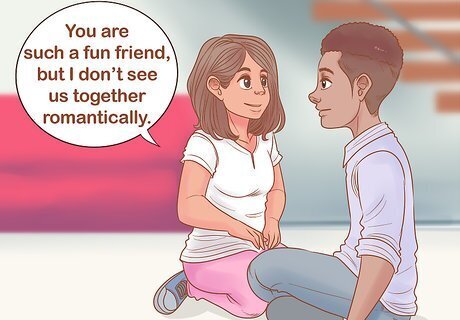
Try complimenting the person and thanking them for the offer. If you know the person who is asking you out, like they’re a friend or a coworker, you definitely don’t want to alienate them and ruin your relationship. Try saying something like, “You are such a fun friend and I enjoy hanging out with you, but I don’t see us working together romantically. I do really appreciate you taking the time to ask, though.” Remember that when someone asks you out, they are putting themselves out there. Try to be gentle if you can.

Use “I” statements to avoid criticizing the other person. Avoid telling them why they don’t match your ideal date—that can be hurtful. Instead, consider saying something like, “I don’t feel a connection between us in that way,” or “I’m looking for something different right now in my dating life.” If they ask for more detail, you can either offer that up, or say, “I don’t really have anything else to share.” If you know the person who is asking you out, it can be especially helpful to focus on the “I” statements so you don’t alienate them and make future interactions strained.

Don’t offer to be friends if that’s not something you’re interested in. If you get along with this person but don’t feel that romantic connection, it’s probably for the best to distance yourself rather than to offer to be friends. Chances are, that person asking you for a date doesn’t feel platonically toward you. Try saying something like, “I think you’re a nice person but don’t feel a romantic connection. Maybe I will see you around sometime!”
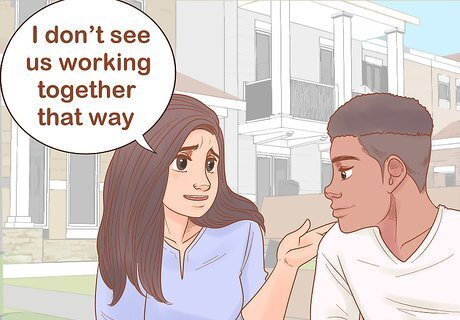
Be assertive and don’t leave room for another conversation. If it’s true that you aren’t looking for a relationship right now, that’s great to say! But if you just aren’t into the person and are trying to gently put them off, telling them that implies there might be a chance in the future for a date. Try saying something like, “I don’t see us working together that way, but thank you for asking.” Keep it as simple as possible to avoid confusion (and to get the conversation over with as quickly as possible!).
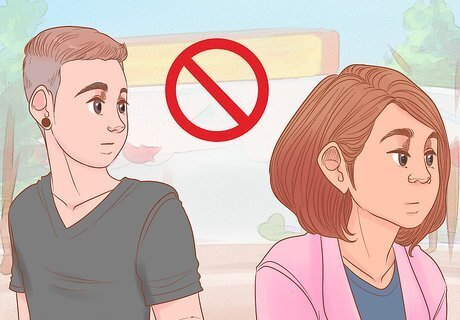
Avoid ghosting or just ignoring the person. One of the worst things is ghosting someone and then running into them on the street or at a party. Instead, try to respond to texts or calls within 48 hours with a response. You won’t feel anxious about potentially running into this person again if you deal with the situation head-on. Consider how you would feel if you asked someone out and then just never heard anything back. It would probably shake your confidence a little bit. If the person did something inappropriate or offensive, though, you shouldn’t feel any responsibility to respond to them again.

Don’t brag to your friends or post on social media about the situation. Avoid embarrassing the person who asked you out or making fun of them. They took a hard step in asking you out, and making a big deal out of rejecting them could make it hard for them to try and establish another relationship in the future. Rather, try and keep the information to yourself, or if you want to talk to someone about the experience, confide in a trusted friend. Avoid taking screenshots of messages and sharing them with others. You don’t want to make someone’s efforts into a joke or shame them for expressing their feelings.

Consider setting them up with a friend if you think they’d get along. Sometimes a person may not be right for you, but maybe you have a friend you think they’d get along with. You can say something like, “I know this may sound a little weird, but I have a friend I think you might connect with. I think you’re nice, but I don’t feel romantically toward you. Could I give them your number?” You’ll find that most people might be a little surprised at first, but ultimately it’ll come as a compliment that you think highly enough of them to respect their time and to set them up on another date.
Dealing with a Persistent Suitor
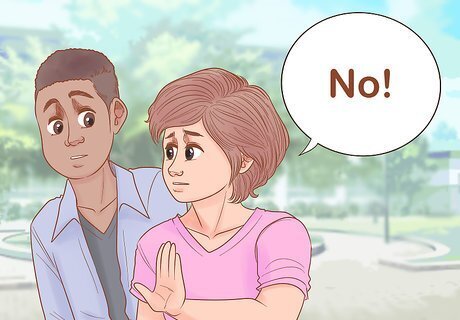
Use direct language with someone who won’t take “no” for an answer. If someone has repeatedly asked you out and you have repeatedly declined, say something like, “I’ve already told you I’m not interested in going out. It makes me uncomfortable that you keep asking me.” Chances are this will stop the person from asking you out again—perhaps they didn’t realize their advances were making you uncomfortable to begin with.

End the conversation with someone who tries to argue with you. If someone tries to argue with you or convince you that you should go out with them after you’ve already expressed you do not want to, it is okay to say something like, “I’m just not interested,” and walk away or stop responding to emails or texts. You could even say something like, “I’m not interested in going out with you, and I feel like you aren’t listening to me when I say so. Please don’t contact me again.”

Remember that you are not obligated to spend time with anybody. If you feel like you owe someone a date because they are nice or did something for you, keep in mind that you get to decide who you spend time with. If your gut is telling you it’s not a good fit, listen to that. Trust your instincts and remember that you don’t need to give anyone an excuse for why you don’t want to go on a date with them if you don’t want to—simply not feeling it is reason enough.

Give a fake excuse if you feel uncomfortable. If you’re in a conversation with somebody who is making you feel uncomfortable and isn’t taking your cues that you don’t want to go out with them, it may be time to make up that fake significant other. Say something like, “I’m actually involved with someone else.” You could also say something like, “I’m traveling a lot for work lately and don’t have the time or energy to date anyone right now.” While it isn’t ideal to lie, if you feel like someone isn’t going to take you at your word that you’re not interested, it may be the quickest way to end a conversation.
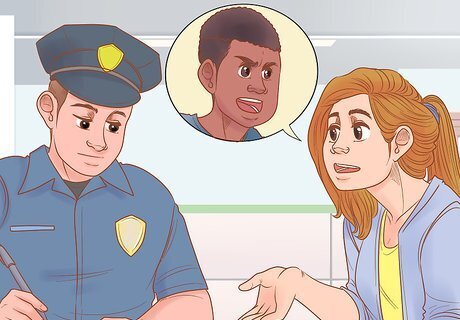
Report harassment to the officials. If someone won’t take “no” for an answer and persistently asks you out after you’ve expressed that they’re making you uncomfortable, tell somebody and consider filing an official complaint with the police. The police may not be able to do anything, but if you make a record and the person continues to harass you, you could end up being able to get a restraining order against them. If anything, making the report will hopefully communicate to that person that their actions are inappropriate. If you’re a teen, make sure to tell your parents or a trusted adult about the harassment. They may be able to intervene on your behalf or help you make an official report with the police department. If someone is harassing you online or via text, take screenshots of those messages so you can use them as evidence of the harassment.




















Comments
0 comment